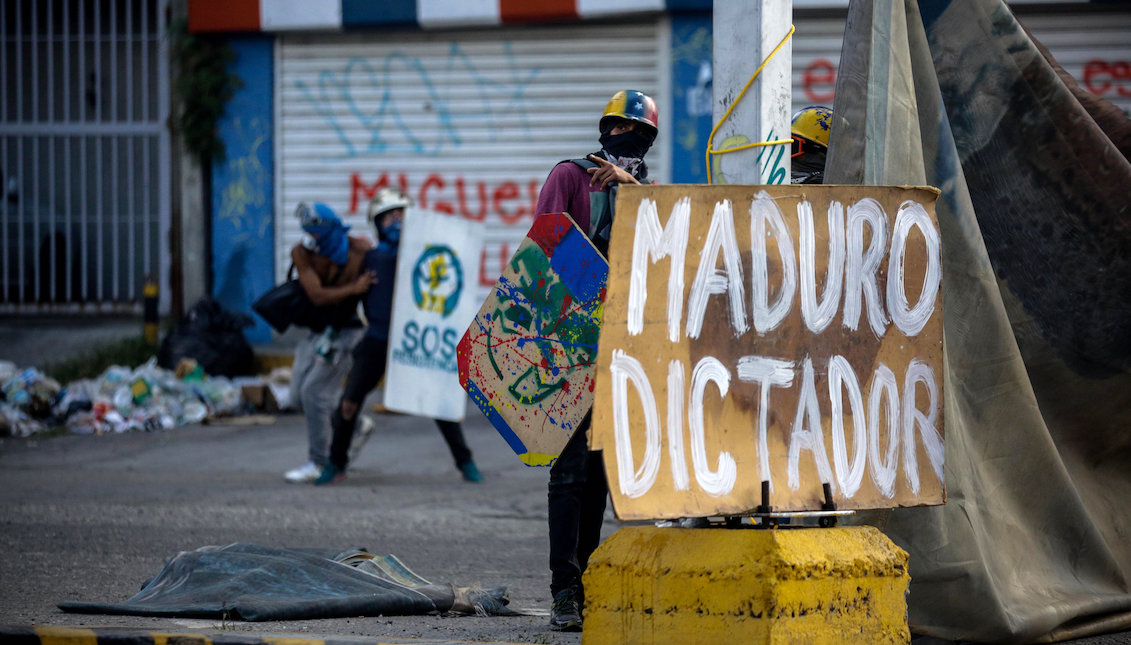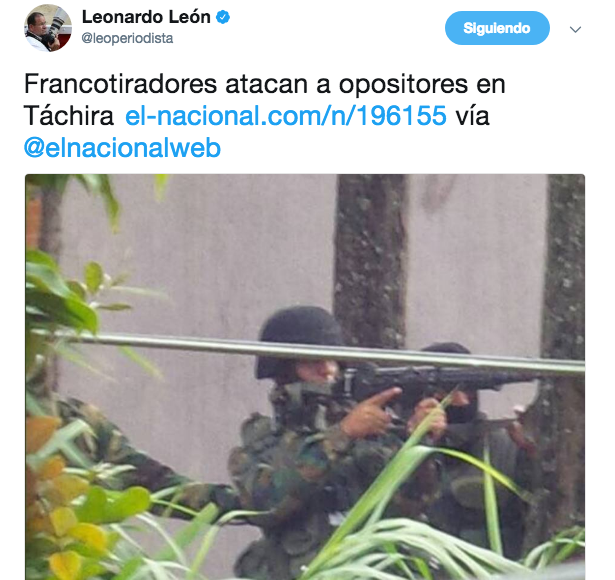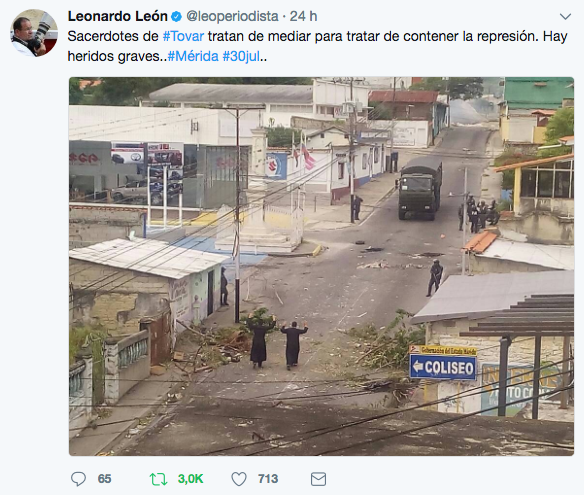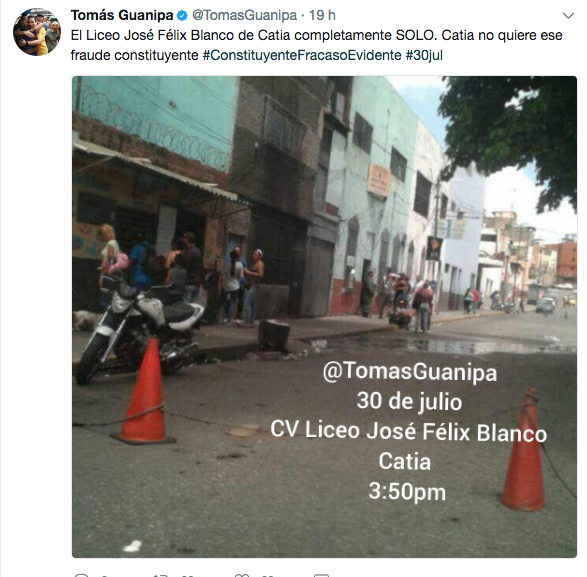
July 30th in Venezuela: many bullets and few votes
A voting day towards a National Constituent Assembly, called by the regime of Nicholas Maduro, resulted in 16 deaths in the hands of the militias of the regime…
Since early in the morning, Venezuela fell into an atmosphere of tension, at the neck of the funnel of a definitive crisis that has lasted more than a hundred days. Contrary to international recommendations, to the will of millions of people who have taken to the streets and an independent suffrage where 7.6 million people said they disagree, the Nicolas Maduro regime launched the electoral day in favor of its National Constituent Assembly.
Yesterday’s election suppose the formation of an Assembly that will draft a new Constitution, burying what was left of the legacy of Hugo Chávez Frías, who began his Bolivarian process drafting the constitution of 1999.
The new Assembly will have 545 exclusively chavistas deputies, who will replace the National Assembly chosen by the citizenship at the end of 2015 and that has become the pillar of the opposition to the regime. In conjunction with the coalition of opposition parties, Mesa de la Unidad Democrática, deputies of the National Assembly have repudiate since day one the Constituent Project of Maduro, which will be composed of the high command of Chavismo, including former Foreign Minister Delcy Rodríguez and the wife of the head of state, Cilia Flores.
On Sunday, all of Venezuela dawned blocked with barricades, symbols of protest since 2014. The civilian population, which demonstrated its discontent during the independent referendum, called by the opposition on July 16, agreed not to participate in the vote by a Constituent Assembly that will plunge the country into a dictatorship par excellence.
From early hours of the morning, several residents denounced the militarization of the streets and the beginning of the repression by law enforcement officials, who complied with the regime's order not to allow protests or media coverage during the day.
According to reports by the national media, 16 people died during the context of the election day: 6 in Táchira state, 5 in Mérida, 2 in Zulia, 2 in Lara and 1 in Sucre.

"The bulk of the murders, contrary to what has happened in the four months of demonstrations, occurred in towns and not in state capitals," said Runrunes, referring to localities such as Chiguará, Tovar and San Jacinto, in Merida; Tucapé, Capacho Viejo and La Grita, in Táchira, and Aguada Grande in Lara.
The dead were Luis Ortiz (17), Albert Rosales (53), Wilmer Smith Flores (21), Ronald Ramirez Rosales (second sergeant of the National Guard), Adrián Rodríguez, 13 years old (for a sniper shot, according to witnesses), Ender Rafael Peña (18), Marcel Pereira, Iraldo Gutiérrez, Eduardo Olave, Angelo Yordano Méndez; a young indigent from Mérida known as Andrés, Luis Beltrán Zambrano Lucena (43), Juan Jose Mones Paez (42), Miguel Urdaneta (25), Heiber Ocando (19) and Ricardo Campos, who was youth secretary of the opposition Democratic Action Party, in Cumaná.
All of them were killed by long-gun fire, which meant that those in control of the streets were army forces, making these 24 hours the most violent day since the begining of the protests.

In a country with a communicative siege as important as the one Venezuela suffers, it is very difficult for its citizens to understand what is happening even in their own cities. The national television, controlled by the regime, published images where the polling stations - especially in the capital - were full of people. But opposition leaders, ordinary citizens and the independent press broadcasted images of dozens of absolutely empty voting centers.

Likewise, and with several hours of suffrage ahead, the opposition leaders made public the figures that the government would give in a result that surpassed more than one million votes to the independent opposition elections, in a campaign to delegitimize the process, which they have categorized as fraud.
"The figures that we now manage, of the group of people who have voted until now with all our calculations and the information that comes to us from the CNE, does not reach 1% of the electoral roll. These are almost one million people who have voted until 3 pm today," said National Assembly President Julio Borges.
Despite the images, the reports and the civil conscience of the circumstance, the president of the National Electoral Council, Tibisay Lucena, announced that the results of the elections were overwhelming, confirming the information that had already made public the opposition bench.
Having previously announced, "99% of the population had exercised their right to vote," Lucena stated at 11:45 pm that 41.53% of the voters had participated, totaling 8,089,320 Venezuelans, almost the same number of people who reelected Hugo Chavez in the presidential elections of 2012.
RELATED CONTENT
According to NTN24, "Lucena indicated that she could not advance the results of the sectorial candidates because the differences are close, while she announced some of the candidates adjudicated territorially, among whom she told Cilia Flores, Iris Varela, Jesus Faría, Diosdado Cabello and Roque Valero," all militants of the chavismo.
A circumstance like this leaves a trail of doubts and skepticism, but considering the undemocratic history of the group that has taken the baton of the Chavist process, it is not difficult to believe that the supposed Venezuelan electoral process has been a smokescreen for the radicalization of an autocratic regime.
This is considered by most of the governments of the region, who have condemned the National Constituent Assembly, considering it "the result of a fraudulent process".
Countries such as Argentina, Colombia, Mexico, Peru and Panama have declared that they will not recognize the results, joining the US government who assured that it would reinforce measures of sanctions against Chávez leaders.
For its part, the Spanish government announced late Sunday that it will not recognize the results of a Constituent Assembly "that is not the result of a broad national consensus, chosen according to democratic rules of free, equal, direct and secret universal suffrage," according to the statement issued by the Ministry of Foreign Affairs and Cooperation.
Likewise, the government of Michel Temer in Brazil has confirmed that the Election Day "confirms the rupture of the constitutional order in Venezuela," reported the newspaper El País.
The only countries that have supported Nicolás Maduro's process have been Bolivia, Nicaragua and El Salvador, representing a minority in the region, compared to a bloc of 10 countries (Argentina, Costa Rica, Mexico, Peru, Panama, Paraguay, Colombia, Brazil, Chile and Guatemala) that have requested a meeting of diplomatic agencies to address the situation, including a possible suspension of Venezuela from Mercosur, as Paraguayan Foreign Minister Eladio Loizaga said.
Likewise, both the US government and the European Union have ignored the constituent process.
With the consolidation of an absolutely Chavist Government Assembly that will certainly ignore any opposition, Venezuela begins the last chapter of the most critical situation in its contemporary history.
The political division of the country is a kilometric fracture, where parallel realities are lived: the one publicized by the government, and the one that the real citizens live.
Violence, the impossibility of a dialogue and the opposition's unresolved decision to continue in rebellion against the government, augurs the worst days of repression and radicalization of the regime's paramilitary force.











LEAVE A COMMENT: